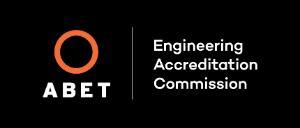Programmatic accreditation information for the Bachelor of Science degree in Aerospace Engineering.
Engineering And Computer Science Programs Accreditation
 ABET
ABET
The Aerospace Engineering (Bachelor of Science) program is accredited by the Engineering Accreditation Commission of ABET under the General Criteria and the Program Criteria for Aerospace and Similarly Named Programs.
The Biomedical Engineering (Bachelor of Science) program is accredited by the Engineering Accreditation Commission of ABET under the General Criteria and the Program Criteria for Bioengineering, Biomedical and Similarly Named Engineering Programs.
The Chemical Engineering (Bachelor of Science) program is accredited by the Engineering Accreditation Commission of ABET under the General Criteria and the Program Criteria for Chemical, Biochemical, Biomolecular and Similarly Named Engineering Programs.
The Civil Engineering (Bachelor of Science) program is accredited by the Engineering Accreditation Commission of ABET under the General Criteria and the Program Criteria for Civil and Similarly Named Engineering Programs.
The Computer Engineering (Bachelor of Science) program is accredited by the Engineering Accreditation Commission of ABET under the General Criteria and the Program Criteria for Electrical, Computer, Communications, Telecommunication(s) and Similarly Named Engineering Programs.
The Electrical Engineering (Bachelor of Science) program is accredited by the Engineering Accreditation Commission of ABET under the General Criteria and the Program Criteria for Electrical, Computer, Communications, Telecommunication(s) and Similarly Named Engineering Programs.
The Mechanical Engineering (Bachelor of Science) program is accredited by the Engineering Accreditation Commission of ABET under the General Criteria and the Program Criteria for Mechanical and Similarly Named Engineering Programs.
The Ocean Engineering (Bachelor of Science) program is accredited by the Engineering Accreditation Commission of ABET under the General Criteria and the Program Criteria for Naval Architecture, Marine Engineering, Ocean Engineering, and Similarly Named Engineering Programs.
The Software Engineering (Bachelor of Science) program is accredited by the Engineering Accreditation Commission of ABET under the General Criteria and the Program Criteria for Software and Similarly Named Engineering Programs.
The Computer Science (Bachelor of Science) program is accredited by the Computing Accreditation Commission of ABET under the General Criteria and the Program Criteria for Computer Science and Similarly Named Computing Programs.
Information Related to Programmatic Accreditation
Departmental Mission Statement
The mission of the Department of Aerospace, Physics and Space Sciences is to guide the next generation of engineers and scientists into careers they will love, to understand the physics of the universe, and drive humanity’s future in the air and in space.
Educational Objectives & Student Outcomes for the B.S. in Aerospace Engineering Program
Program educational objectives for the B.S. in Aerospace Engineering program at Florida Tech
- Academic fundamentals: Graduates have successfully applied and integrated their knowledge of fundamental principles in their chosen careers or in their graduate studies.
- Engineering practice: Graduates have used their engineering skills in the successful completion of an engineering project.
- Teamwork and communication: Graduates have demonstrated the ability to communicate their ideas and technical results verbally, in writing and via presentations, and are effective team members.
- Professional development: Graduates have advanced their knowledge and contributed to the profession and society.
Student outcomes for the B.S. in Aerospace Engineering program at Florida Tech
- an ability to identify, formulate, and solve complex engineering problems by applying principles of engineering, science, and mathematics
- an ability to apply engineering design to produce solutions that meet specified needs with consideration of public health, safety, and welfare, as well as global, cultural, social, environmental, and economic factors
- an ability to communicate effectively with a range of audiences
- an ability to recognize ethical and professional responsibilities in engineering situations and make informed judgments, which must consider the impact of engineering solutions in global, economic, environmental, and societal contexts
- an ability to function effectively on a team whose members together provide leadership, create a collaborative and inclusive environment, establish goals, plans tasks, and meet objectives
- an ability to develop and conduct appropriate experimentation, analyze and interpret data, and use engineering judgment to draw conclusions
- an ability to acquire and apply new knowledge as needed, using appropriate learning strategies

 Give to Florida Tech
Give to Florida Tech 